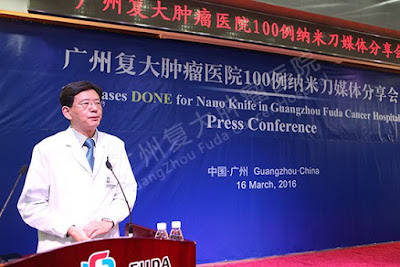Prof. Niu Lizhi, President of FUDA, announced that Guangzhou Fuda Cancer Hospital has completed 100 cases of NanoKnife
A memorable moment
At 1:30 p.m., March 8, 2016, Prof. Niu Lizhi, President of Guangzhou Fuda Cancer Hospital walked into the operation room in the dark green surgical gown to perform one case of NanoKnife.
It was a memorable moment as it marks the 100th case of NanoKnife that Guangzhou Fuda Cancer Hospital has done. The patient lying on the operating table was Ms. Gregerson Gurli, a 68-year-old retired teacher from Denmark--a legendary woman. In 2007, she was diagnosed with pancreatic cancer with liver metastases. Her doctor in Denmark said she only had two to three months to live. As she found no other good treatment in several European hospitals, she came to Guangzhou Fuda Cancer Hospital for treatment in February 2008. Gurli has undergone cryoablation, iodine seeds implantation therapy and other comprehensive treatments at FUDA from 2008 till now. Despite that cancers are still present in her body, she has survived for over 8 years since diagnosis. It is the concept of living with cancer that has rendered her a prolonged life.
Prof. Niu noted that the 100th case of NanoKnife was done on liver tumors. “Recently, Ms. Gurli has been found to have multiple neuroendocrine tumors in liver. There are three tumors detected, the largest is about 5cm in size and the other two are about 4cm and 2cm in size respectively. Considering that the masses are big in size and are close to important structures as hepatic diaphragm dome and hepatic hilus, NanoKnife therapy will be able to deliver higher safety and less side effects. ”
All was ready and the treatment got started. The medical team led by Prof. Niu performed ablation on the biggest mass first. The mass was located at the S7 of liver and had high activity. Under the guidance of ultrasound and CT scan, Prof. Niu punctured the two NanoKnife probes into the base of tumor for ablation. Then the probes were relocated to ablate the other two masses. The screen clearly showed that the masses became necrosis and gasification after ablation; small bubbles were formed; the previous high-density echo became lower...Prof. Niu was satisfied with the ablation result. He noted, “As NanoKnife is a highly secure and mini-invasive treatment, the multiple masses in liver can be ablated at one time. Today, three masses in her liver have been ablated. The procedure went smoothly.”Five great leaps achieved by FUDA in the research on and clinical application of NanoKnife.
At the press conference, Prof. Niu Lizhi introduced to the reporters that NanoKnife is currently the latest cutting-edge ablation technology for tumor in the world. During the procedure, high electric-field and ultra-short pulses are given to destroy lipid bilayer structure of cancer cell membrane and form numerous irreversible nano-sized pores in the cell membrane. Cell membrane permeability will be changed to allow molecules of different sizes free access to cells, which will lead to cell death. NanoKnife has been approved by America FDA in April, 2012 and has been certified to CE certification of EU. In June 2015, NanoKnife was approved by Chinese FDA for clinical application. Guangzhou Fuda Cancer Hospital has been five No. 1 in terms of the research on and clinical application of NanoKnife.
At the press conference, Prof. Niu Lizhi introduced to the reporters that NanoKnife is currently the latest cutting-edge ablation technology for tumor in the world. During the procedure, high electric-field and ultra-short pulses are given to destroy lipid bilayer structure of cancer cell membrane and form numerous irreversible nano-sized pores in the cell membrane. Cell membrane permeability will be changed to allow molecules of different sizes free access to cells, which will lead to cell death. NanoKnife has been approved by America FDA in April, 2012 and has been certified to CE certification of EU. In June 2015, NanoKnife was approved by Chinese FDA for clinical application. Guangzhou Fuda Cancer Hospital has been five No. 1 in terms of the research on and clinical application of NanoKnife.
1. FUDA is the first cancer hospital in mainland China to have introduced NanoKnife.
2. As early as in August 2014, Xu Kecheng and Niu Lizhi compiled and published New Technique of Cancer Ablation Irreversible Electroporation--the first monograph on NanoKnife in China.
3. On July 2, 2015, the first case of NanoKnife in mainland China was completed at FUDA. The patient was a 61-year-old pancreatic cancer patient from a Middle East country.
4. As of March 8, 2016, 100 cases of NanoKnife have been done for patients with advanced pancreatic cancer, liver cancer etc. It has ablated the lesions and improved the quality of life for cancer patients. The cases of NanoKnife that has been done at FUDA rank the first in mainland China.
5. The number of papers on NanoKnife published on authoritative magazines, including Journal of Interventional Radiology and Chinese Journal of Radiology, etc. ranks the first in China.
Prof. Niu Lizhi noted, “NanoKnife can achieve complete ablation on small tumors and control and shrink big tumors. Looking back on the 100 cases of NanoKnife we have done, we found that NanoKnife has been delivering good curative effect for pancreatic cancer and liver cancer patients. The remission rate exceeds 80%, approaching the world level. With the development of the technology and the accumulation of experience, I’m convinced that NanoKnife will bring benefits to more cancer patients.”

No comments:
Post a Comment